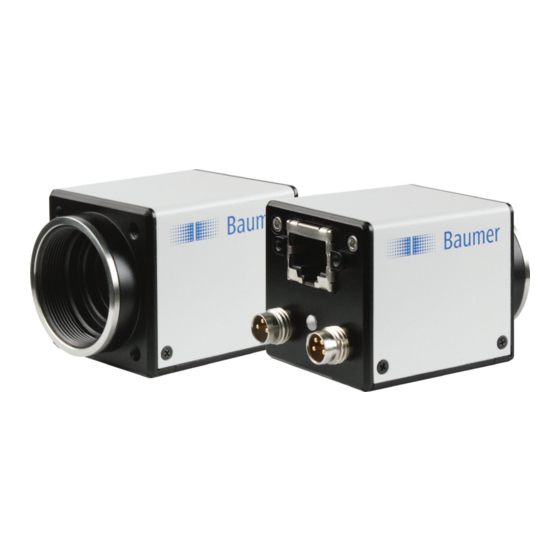Baumer EXG50 Manuale d'uso - Pagina 30
Sfoglia online o scarica il pdf Manuale d'uso per Fotocamera digitale Baumer EXG50. Baumer EXG50 42. Gigabit ethernet
Anche per Baumer EXG50: Manuale d'uso (42 pagine)

Figure 41 ►
DHCP Request
(broadcast)
DHCP Lease Time:
The validity of DHCP IP
addresses is limited by the
lease time. When this time
is elapsed, the IP configu-
ration needs to be redone.
This causes a connection
abort.
Figure 42 ►
DHCP
Acknowledge-
ment (unicast)
LLA:
Please ensure operation
of the PC within the same
subnet as the camera.
30
▪ DHCP Request
Once the client has received this DHCPOFFER, the transaction needs to be con-
firmed. For this purpose the client sends a so called DHCPREQUEST broadcast to the
network. This message contains the IP address of the offering DHCP server and
informs all other possible DHCPservers that the client has obtained all the necessary
information, and there is therefore no need to issue IP information to the client.
▪ DHCP Acknowledgement
Once the DHCP server obtains the DHCPREQUEST, a unicast containing all neces-
sary information is sent to the client. This message is called DHCPACK.
According to this information, the client will configure its IP parameters and the pro-
cess is complete.
5.4.3. LLA
LLA (Link-Local Address) refers to a local IP range from 169.254.0.1 to 169.254.254.254
and is used for the automated assignment of an IP address to a device when no other
method for IP assignment is available.
The IP address is determined by the host, using a pseudo-random number generator,
which operates in the IP range mentioned above.
Once an address is chosen, this is sent together with an ARP (Address Resolution Pro-
tocol) query to the network to to check if it already exists. Depending on the response,
the IP address will be assigned to the device (if not existing) or the process is repeated.
This method may take some time - the GigE Vision
connection in the LLA should not take longer than 40 seconds, in the worst case it can
take up to several minutes.
5.4.4. Force IP
*)
Inadvertent faulty operation may result in connection errors between the PC and the camera.
In this case "Force IP" may be the last resort. The Force IP mechanism sends an IP ad-
dress and a subnet mask to the MAC address of the camera. These settings are sent
without verification and are adapted immediately by the client. They remain valid until the
camera is de-energized.
*) In the GigE Vision
standard, this feature is defined as "Static IP".
®
standard stipulates that establishing
®
